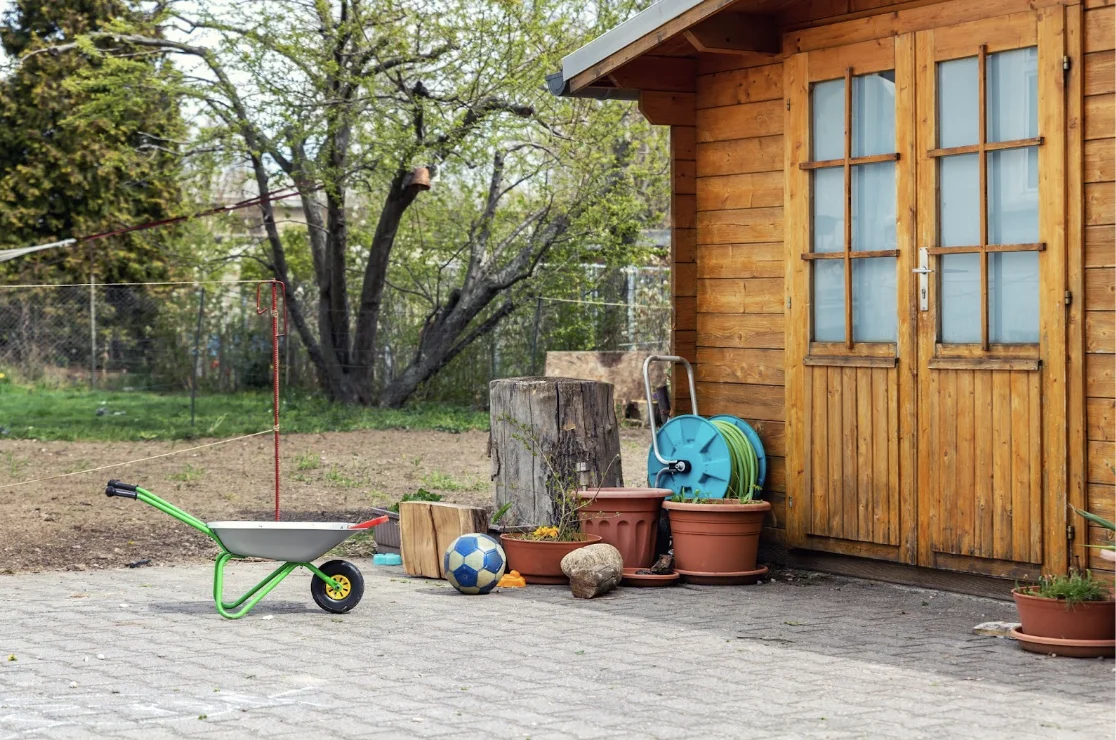When you think about home insurance, you often focus on your house. However, detached garages, sheds, and swimming pools also need coverage. Knowing whether these are included in your homeowner’s insurance policy and understanding the limitations of this coverage are crucial for protecting your property.
Coverage for Outdoor Structure
Many homeowners may need to realize that structures separate from the main house, such as garages, sheds, and pools, can also be covered under their home insurance policy. However, the specifics can vary greatly between different insurance plans. It is essential to check your policy for details about what is covered and to inform your insurance company about the existence of these structures. This guarantees that your coverage is sufficient and that you are paying a fair price that reflects the current condition of your property.
Sheds and Outdoor Buildings
Home insurance policies typically include outdoor buildings like garden sheds or garages for storing lawn mowers and other tools. However, the amount of coverage can differ. Consider whether you need additional coverage beyond your standard policy if you have expensive equipment. For instance, a Personal Articles Policy could protect high-value machinery or sports gear, offering coverage beyond what your home policy might allow. Some examples of coverage options include :
- Actual Cash Value: Covers the item’s cost minus depreciation.
- Replacement Cost Coverage: Covers the full cost to replace the item at current prices.
- Scheduled Personal Property Coverage: Ideal for specific high-value items and usually requires no deductible.
Swimming Pools
Owning a swimming pool increases your liability risks, meaning the chances that someone could get hurt and you might be held responsible. Most home insurance policies offer some liability protection, but having a pool usually means you need additional coverage. Insurance experts recommend enhancing your liability coverage or acquiring an umbrella liability policy for extra protection.
To further protect yourself, you can implement safety measures such as:
- Installing a fence with a self-closing, lockable gate to prevent unauthorized access.
- Setting clear pool rules, like no diving in shallow water and walking instead of running around the pool.
- Installing non-slip surfaces to reduce the risk of falls.
- Always supervise children in the pool area to prevent accidents.
- Keeping first aid equipment readily available near the pool.
Also, check with your local municipality to make sure your pool and fence meet all safety requirements. This not only helps prevent accidents but also ensures compliance with local laws, which can impact insurance claims.
Coverage for Fences
Fences are usually covered under the “other structures” part of home insurance policies. The amount you can claim, however, depends on the policy type and the material of the fence. In some cases, you only get the depreciated value of the fence rather than the cost to replace it. This is why understanding the specifics of your policy is important.
General Policy Review and Recommendations
It’s crucial for homeowners to regularly review their insurance policies to ensure that all structures on their property are adequately covered. Talking to an insurance agent is a good idea if you need more clarification. They can help clarify what is and isn’t covered under your current policy and discuss options for additional protection. This might include bundling different types of insurance, such as home, car, and life insurance, which can sometimes offer cost savings.
Summary
Insurance for backyard structures is an often overlooked aspect of homeownership. You protect your investments and secure peace of mind by ensuring that structures like sheds, garages, and pools are properly covered. Carefully review your policy details and consider consulting with an insurance professional to customize your coverage to suit your needs. This proactive step can help you avoid unexpected issues and protect your property.
FAQs
How does homeowners insurance cover equipment related to backyard structures, like pool cleaning systems or solar panels on a shed?
Equipment like pool cleaning systems or solar panels typically requires additional coverage because standard policies might not fully cover these items. It’s best to discuss specific equipment with your insurer to ensure they are adequately insured under your policy.
What are the implications of not disclosing a backyard structure to my insurance provider?
Not disclosing a backyard structure to your insurance provider can lead to insufficient coverage and potential denial of claims related to that structure. Always inform your insurer about any new or existing structures to ensure they are properly covered.
How do local building codes affect insurance coverage for backyard structures?
Compliance with local building codes is essential for insurance coverage. If a structure does not comply with these codes, it may not be covered, or coverage may be limited in the event of damage. Always ensure that any new or modified structures meet local regulations.
Can changes to a backyard structure affect my overall home insurance premiums?
Yes, significant upgrades or changes to backyard structures can affect your insurance premiums. Improvements that increase the value of the structure or pose additional risks (like adding a pool) might increase premiums, while upgrades that enhance safety could potentially lower premiums.
Get the right coverage for your home with tutenagency
New tutenagency customers?
Quote homeowners insurance online or call (334) 502-5111 to insure your home.
Legal Disclaimer: ADVERTISING MATERIAL ONLY. Do not rely on this site or this article for legal or financial advice. The information provided on 210agency.com is strictly for educational purposes and to provide you with general educational information. Since state laws and financial regulations are subject to change, please schedule an appointment with an attorney or qualified financial advisor in your area to further discuss your personal situation. This public information is neither intended to, nor will it, create an attorney-client or financial representative relationship.

